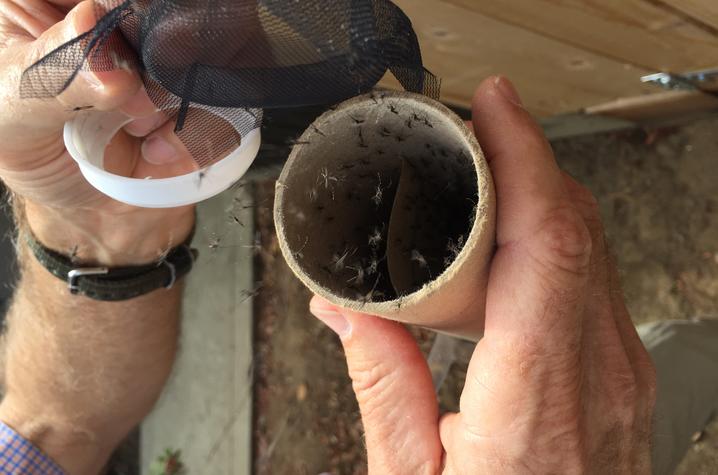UK Research Spinoff Company MosquitoMate Expands Lexington Operations
LEXINGTON, KY. (June 14, 2017) – A Lexington-based biotech company and spinout of the University of Kentucky is growing its operations to meet demands of mosquito-borne disease and pest control in the United States. Mayor Jim Gray and UK President Eli Capilouto today joined MosquitoMate officials and local leaders to celebrate the grand opening of the company’s newly expanded facilities in Lexington.
MosquitoMate Inc. is expanding its facilities to produce sterile male mosquitoes that will serve as a nontoxic, non-GMO pesticide. Unlike female mosquitoes, male mosquitoes do not bite. Since female mosquitoes tend to be monogamous, once a sterile male mates with a female, her eggs will not hatch eliminating the next generation of mosquitoes.
The company is creating 12 new jobs in addition to the 10 existing jobs in their Research and Development facility off Regency Road. At capacity, the new facility will be able to produce in excess of 50 million eggs per week and three million sterile males per week. Poised for Environmental Protection Agency approval, the company will be able to sell the sterile male mosquitoes to combat pest control issues.
“Our city and our state benefit from the jobs created by UK brainpower. It’s one reason university cities like ours have a high rate of business starts. MosquitoMate is also offering our city important new ways to protect citizens from mosquito-borne illnesses, like Zika,” Mayor Gray said. “Congratulations to MosquitoMate.”
The new 6,000-square-foot mosquito production facility will be the first of its kind to produce and distribute non- GMO ZAP male mosquitoes as a biopesticide against the Asian tiger mosquito (Aedes albopictus), an invasive mosquito commonly known to carry infectious diseases like Zika virus, dengue, chikungunya and pet animal heartworm. This facility will serve as a model for future facilities throughout the country and internationally, as well as improve capacity for MosquitoMate to provide environmentally friendly, front line solutions to fight the potential spread of disease.
“Developing innovative pest control solutions using environmentally friendly technology continues to be our focus,” said MosquitoMate founder and President Stephen Dobson, an entomology professor in UK's College of Agriculture, Food and Environment. “Lexington’s startup business environment and its close proximity to a leading research university is ideal for us to continue to develop ideas, perform research and commercialize products.”
The company’s nonchemical, non-GMO approach to mosquito control involves producing nonbiting, ZAP male mosquitoes that carry a naturally occurring bacterium called ‘Wolbachia.’ Wolbachia bacteria occur in over half of all insects naturally. When a ZAP male mates with Tiger mosquito females, their eggs do no hatch. If enough of the Tiger mosquito eggs do not hatch, then the population goes away, without having to use chemicals that can harm bees and butterflies.
As more nonbiting ZAP males are released, the biting mosquito population can decrease dramatically. A series of successful trials have been conducted by MosquitoMate and its partners in California, New York and Lexington. Current trials are underway in South Florida.
MosquitoMate’s approach is species-specific. Male mosquitoes do not try to mate with bees or butterflies, and so unlike many traditional chemical control methods, the MosquitoMate ZAP males do not harm beneficial insects.
“Our research and creative discovery shape industry, create jobs and broaden our understanding of the human, artistic and technological world, “said UK President Eli Capilouto. “This work highlights, in a compelling way, our role as an economic engine for the Commonwealth and as the University for Kentucky.”
“Our cabinet is proud to support MosquitoMate’s innovative work, both because it adds to our state’s biotech sector and that it reduces an annoyance and potentially disease-carrying hazard we all face this time of year,” said Terry Gill, secretary of the Kentucky Cabinet for Economic Development. “Today’s event provides a great example of how promoting an atmosphere for R&D and entrepreneurship in Kentucky, companies ultimately create new economic impact as they mature. I congratulate MosquitoMate on opening its new facility and look forward to working with them in the future.”
“The Bluegrass Business Development Partnership has enjoyed working with MosquitoMate on their site selection process over the last few years,” said Carla Blanton, Commerce Lexington Inc.’s board chair. “With a flagship research university and our highly educated workforce, Lexington is a prime location for MosquitoMate’s growth. Congratulations on your expansion.”
“MosquitoMate is an excellent example of success being cultivated here in Central Kentucky,” said Terry Samuel, executive vice president and chief operating officer of the Kentucky Science and Technology Corporation. “Start with leading scientists leveraging technology and expertise from UK, add in support from Commerce Lexington Inc., the Kentucky Science and Technology Corporation and the Cabinet for Economic Development and the result is a home-grown company that is not only growing commercially, but also preventing the dissemination of some of the world's most serious diseases.”
For more information on MosquitoMate, visit www.mosquitomate.com.





